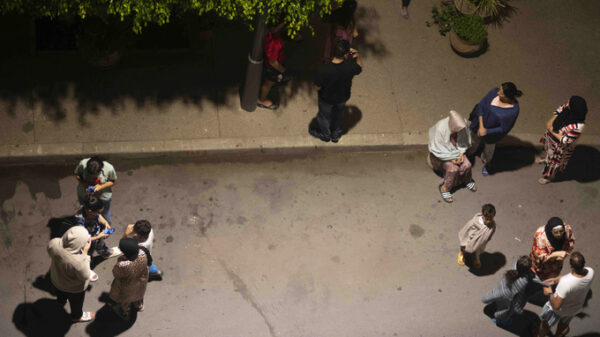A young woman prepares to get vaccinated against COVID-19 at a health facility in Harare, Zimbabwe on Friday, Sept, 24, 2021. Many employers in Zimbabwe are mandating COVID-19 vaccines for their staff, and the government has its own requirement that its 500,000 employees get the shots. That sets the southern African nation apart from nearly every other on the continent, where the most immediate challenge is still simply acquiring enough doses. (AP Photo/Tsvangirayi Mukwazhi)
HARARE, Zimbabwe (AP) — For months, Acholo Jani was told to get a COVID-19 vaccination because it might save his life. He hesitated, fearful of potential side effects. But the moment he was told it would save his job, Jani got in line.
The 43-year-old mechanic’s employer is among many in Zimbabwe mandating shots for their staff, including the government, which is requiring the vaccine for its 500,000 employees. That sets the southern African nation apart from nearly every other on the continent, where the most immediate challenge is still simply acquiring enough doses.
Zimbabwe, by contrast, says it has ample supply for now, mostly purchased from China, but that hesitancy is holding back its campaign — a problem that has also troubled other African countries, partly driven by a general distrust of authorities. But Zimbabwe’s strategy is raising worrying rights questions.
Critics say that, unlike in richer countries that have made use of mandates, Zimbabwe’s rollout isn’t up to the task. Vaccination centers sometimes run out of supply, and poor urban townships and rural areas have often been starved of doses in recent months.
What’s more, they say, it’s cruel to put at risk the livelihoods of people who are some of the world’s most vulnerable and already suffering during the pandemic.
“The Zimbabwe government should first focus on making sure that vaccines are equally available to all people without any obstacles before considering making them mandatory,” said Dewa Mavhinga, southern Africa director for Human Rights Watch.
Mavhinga called for addressing vaccine hesitancy “in a way that builds public trust and confidence in the vaccines without the use of force.”
But the government, known for being authoritarian, appears ready to double down. It already requires vaccines at places of worship and has suggested extending the mandates to public buses — a critical mode of transportation for the country’s poor. Access to informal markets, on which millions rely to buy or sell goods, might also be restricted.
Those measures would effectively make the vaccine a requirement for the vast majority of Zimbabwean adults, even the two-thirds of the working population with informal jobs unlikely to be touched by employer mandates.
At Jani’s workplace, a vaccination card, a pocket-sized booklet with the government’s emblem on the front, is now “your gate pass,” he said.
“There is nowhere to hide,” he said while waiting for his vaccine on a dusty road outside a clinic in the Mufakose township of the capital, Harare.
Jani eventually got his first shot — after joining the line at 5 a.m. and waiting for seven hours — but others are not so lucky.
Critics say that, unlike in richer countries that have made use of mandates, Zimbabwe’s rollout isn’t up to the task. Vaccination centers sometimes run out of supply, and poor urban townships and rural areas have often been starved of doses in recent months.
What’s more, they say, it’s cruel to put at risk the livelihoods of people who are some of the world’s most vulnerable and already suffering during the pandemic.
“The Zimbabwe government should first focus on making sure that vaccines are equally available to all people without any obstacles before considering making them mandatory,” said Dewa Mavhinga, southern Africa director for Human Rights Watch.
Mavhinga called for addressing vaccine hesitancy “in a way that builds public trust and confidence in the vaccines without the use of force.”
But the government, known for being authoritarian, appears ready to double down. It already requires vaccines at places of worship and has suggested extending the mandates to public buses — a critical mode of transportation for the country’s poor. Access to informal markets, on which millions rely to buy or sell goods, might also be restricted.
Those measures would effectively make the vaccine a requirement for the vast majority of Zimbabwean adults, even the two-thirds of the working population with informal jobs unlikely to be touched by employer mandates.
At Jani’s workplace, a vaccination card, a pocket-sized booklet with the government’s emblem on the front, is now “your gate pass,” he said.
“There is nowhere to hide,” he said while waiting for his vaccine on a dusty road outside a clinic in the Mufakose township of the capital, Harare.
Jani eventually got his first shot — after joining the line at 5 a.m. and waiting for seven hours — but others are not so lucky.
Copyright 2021 Associated Press. All rights reserved.









































